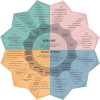Identifying core global mental health professional competencies: A multi-sectoral perspective
- PMID: 38572254
- PMCID: PMC10988164
- DOI: 10.1017/gmh.2024.26
Identifying core global mental health professional competencies: A multi-sectoral perspective
Abstract
Concerned with sustainably alleviating mental distress and promoting the right to health worldwide, global mental health (GMH) is practised across various contexts spanning the humanitarian-development-peace nexus. The inherently intersectoral and multidisciplinary nature of GMH calls for competency frameworks and training programmes that embody diversity, decolonisation and multiprofessionalism. Existing competency frameworks have failed to capture the multi-sectoral, inter-professional nature of contemporary GMH practice. In response to these needs, a qualitative content analysis of relevant job advertisements was conducted to distil a comprehensive set of professional competencies in contemporary GMH practice. Approximately 200 distinct skills and competencies were extracted from 70 job advertisements and organised into four meta-dimensions: 'skills', 'sector', 'self' and 'subject'. The first known systematic attempt at a multi-sectoral GMH competency framework, it offers a springboard for exploring vital yet overlooked professional competencies such as resilience, self-reflection, political skills and entrepreneurialism. On this basis, recommendations for building a competent, agile and effective GMH workforce with diversified and future-proof skillsets are proposed. The framework can also inform inter-professional training and curriculum design, and capacity-building initiatives aimed at early-career professional development, particularly in low- and middle-income settings.
Keywords: Capacity; Competence; Education; Global mental health; Training.
© The Author(s) 2024.
Conflict of interest statement
The authors declare no conflict of interest.
Figures
References
-
- Acharya B, Buzza C, Guo J, Basnet M, Hung E and Van Dyke C (2024) Developing a global mental health training curriculum. In Acharya B and Becker AE (eds.), Global Mental Health Training and Practice. New York: Routledge, pp. 81–95.
LinkOut - more resources
Full Text Sources

